- Home
- Aimee Easterling
Shiftless: A Fantastical Werewolf Adventure Page 2
Shiftless: A Fantastical Werewolf Adventure Read online
Page 2
Since then, it had begun to rain. A gentle autumn shower at first, but now the pounding storm was pulling leaves from the trees and was muffling even the sound of my own footsteps. Water was trickling down my spine despite my hooded slicker, and I could just imagine how a two-year-old would feel, cold and scared, lost in the woods. Her father had told us Melony was wearing shorts and a thin t-shirt—she might already be experiencing symptoms of hypothermia.
The light was beginning to fade, and urgency tempted me to push myself into a trot. Instead, I slowed down, took a deep breath...and sat. I would have received a phone call if Melony had been found, which meant everyone else was probably getting these same jitters of a hunt about to be lost. They would be rushing around like crazy people, and the night would likely end with at least a sprained ankle to remind some careless ranger of the hunt. Worse, my gut said that if Melony didn’t turn up soon, she wouldn’t turn up alive.
But my unconventional childhood left me equipped to handle the tail end of a difficult hunt...if I could just draw upon the memories I’d been hiding from for the last ten years. The problem was that, although I desperately needed to shift forms so I could sniff out Melony’s trail, the last time I’d been hunting through rain-darkened woods with my wolf rampant, the day hadn’t ended well.
I was seventeen then, newly fled from my home pack and trying to eke out a living in a forest much like this one. The woods had always been my safe, secret place as a child, but after I left Haven, reality set in. Without a home to return to, life was a constant battle against the elements...and against my wolf nature.
That year, it seemed that I was always cold and hungry, and the call of my wolf was endlessly enticing. While I was shivering under my lean-to shelter made of branches and a scavenged garbage bag, the wolf begged me to shift forms so her fur could keep us dry. When I was itching for a warm meal, she whispered that we could stalk a rabbit four-footed and slake our thirst with hot blood. No one will see us here, she breathed in my ear. It’s safe to be a wolf.
I knew she was wrong, but I was so miserable that one day I let the wolf have her head. As the days grew shorter, less and less wild food was available for the picking, and it had been over forty-eight hours since I’d found anything other than twigs to gnaw on. In the preceding weeks, I’d caught fish, had set snares, and had even ground acorns between rocks and pinned them in my t-shirt in the running water of a creek to leach out the bitter tannins. And, for a while, there had been enough to carry me through. But this week, no food was to be found.
The hunger gnawed at my belly, but if I was honest, it was the loneliness that really did me in. Werewolves weren’t meant to spend so long away from a pack, and the simplicity of my wolf’s brain made it easier for the canine to handle lack of pack mates—she missed the company but didn’t dwell upon what was absent. So, at last, I gave in to the wolf’s seductive promises. I shed my dripping t-shirt and jeans, then let my arms turn into legs and my wolf take control.
As soon as I shifted, my darker side went wild with the freedom, racing down a deer path that my human form had barely been able to make out amid the lush growth. She yipped and cavorted, dancing with shadows, and my human brain went along for the ride, riding the wolf’s exhilaration like a roller coaster. It had been so long since I’d felt any pleasure that the wolf’s simple enjoyment acted like a drug, impairing my ability to hang onto human thoughts.
After minutes or hours of headlong flight, we smelled a deer. The wolf slowed her pace and began to stalk the prey, even though we both knew that a single wolf was unlikely to take down an ungulate. We circled around behind the doe, our feet padding silently across wet leaves, and my human brain woke enough to remind the wolf of sharp deer hooves, of the necessity to chase a deer until she was heaving from lack of air and had slowed enough for us to puncture sharp teeth through her throat. This was a job for a pack, each wolf running in relay to spell her siblings until the deer collapsed from exhaustion.
So we run, the wolf responded, ignoring the reference to pack mates—to a wolf brain, there was no point in bemoaning an absence beyond our control. But before we could set out after the deer, the wolf stopped in her tracks and scented the air, her tail rising into an excited banner. Not far away was easier prey, tasty, small, and young. Together, my wolf and I salivated at the impending feast.
Human! It took me far too long to realize that in her headlong flight, the wolf had drawn us beyond our usual territory, to the edge of the forest where houses butted up against the trees. Until that moment, I’d steered clear of humanity because a teen runaway had no place in mainstream society, but now I knew we should have given the subdivision a wide berth for another reason. Even to my human brain, the child playing at the edge of the trees smelled like prey, and I was sickened by my own hunger.
As my human brain struggled to regain control of our body, it became the wolf’s turn to push me down into her cage. Again, the wolf began to stalk, and now I had to reach up through the bars to fight the canine every step of the way. We sidled and slipped in the leaves as I clawed against my darker half, but with the single-minded focus of her lupine heritage, the wolf ignored all my entreaties. I could only watch, aghast, as a young child came into view, playing in a sand box just beyond the forest edge.
There was no art to the hunt, but my wolf was hungry and didn’t care. She lunged out of the trees, her teeth settling around the child’s plump arm, tasting sweet flesh even as the girl shrieked at the top of her lungs. Scenes flickered in front of me, blood and terrified eyes, sand turning red. I banged on the door of the cage with all my might, to no avail.
Then an adult human tore out of the house, a gun in his hands. He fired, the bullet grazing our shoulder, and the shock was enough to make the wolf pause, to relax her iron control over my human brain. I leaped upwards out of the cage, pushed the wolf out of the way, and was shifting even as we fled back into the forest. I could hear the girl crying behind us, so I knew our prey wasn’t dead, and since werewolves are born not made, she would never start howling at the moon. But that knowledge did little to ease my guilt and horror. With the last of my strength, I pushed the wolf so deeply into her cage that she couldn’t even speak to me, let alone run wild, then I clanged the door shut and threw away the key. And although I felt her every day afterwards, gnawing at my bones, I hadn’t seen the wolf since.
***
It seemed like poetic justice that I would be forced to call upon my wolf at last in order to save another little girl alone in the cold autumn woods. I was terrified to even touch my wolf brain, let alone to bring an impulse-control-challenged wolf out to hunt a tasty toddler. I could imagine getting in touch with my wolf brain, tracking down the child, and then doing something unspeakable. But if I didn’t find the toddler, would a slow descent into hypothermia be any worse for Melony?
So I closed my eyes, ignored the way the wet ground was soaking through the seat of my pants, and began to count my breaths. In and out, slowing down, until I could hear past the rain dripping off the trees. The metallic chip of a cardinal settling onto its perch punctuated the evening. The musky scent of a fox coming out of its daytime den drifted toward my nose. I heard the snort and stamp of a deer as she pounded her forefoot against the ground to determine whether a strange object was danger, or just a fallen tree.
It had been so long since I’d changed that I almost didn’t recognize the first symptom: the sensation of hairs pushing out of my skin at a thousand times their normal speed. As a teenage werewolf, I remember shifting nightly to tempt the hair on my head to grow longer after a bad trim, never mind that I’d always have to shave my legs afterwards, even if the skin had felt smooth as a baby’s bottom before the change. Now the tickling itch was so unfamiliar, it almost pulled me out of my meditative trance.
In and out, counting breaths, I forced my focus back onto the shift. For some werewolves, the next sign of the change was the reason they stayed in human form whenever possible. Itching gave way to
shooting pains as my bones became malleable, ready to morph into wolf shape. But I had a high pain threshold, and the invisible daggers were a welcome hint that I might actually shift this time, might actually find my wolf (and Melony) before it was too late.
But hope faded as I felt the wolf brain taking over my thoughts. No, erasing my thoughts and replacing them with wordless visions and drifts of feelings. I wanted to shift so badly...but I was terrified of the loss of control. Maybe when I’d lived back in Haven, isolated in our werewolf-only community, I could have let my inner wolf loose. There, if my wolf had gone feral, a dozen stronger wolves would have taken me down. Here, I was surrounded only by weak humans, their scent already making me salivate. I could sense the two-footers all around me, the closest one no more than a hundred feet away. His nose was running and he was out of breath, but I could tell he’d eaten pizza for lunch, the tomato sauce providing a piquant addition to his already enticing odor.
I jerked myself out of the wolf brain as abruptly as I often woke from a night’s sleep, but this time the reason was terror of my wolf’s appetites. With the wolf brain’s retreat came an absence of the extra senses my darker side had made possible, and the woods around me once again seemed muffled by the quiet fall of rain. Dropping my head into my hands, I knew I’d failed. I had hoped to find that happy middle ground between wolf and human, where I could take advantage of the wolf’s intuitive understanding of the woods without risking letting a predator loose on the unsuspecting human world. Instead, I’d gone too far and lost it all. Now I was back to 100% human, no intuition, and Venus already visible in the darkening sky.
One of the few good things about being an obsessively controlled werewolf, though, is that if I told myself despair wasn’t an option, I actually believed my own lie. Might as well keep stumbling around out here like everyone else, I thought. After all, my co-workers hadn’t given up, and they never even had the possible backup of a sharp canine nose to aid them. In human form, I could trick myself into believing that I wasn’t any further behind than I’d started, even if I had lost the one skill that might have saved Melony’s life.
“The poor dear,” my older co-worker Maddie had said when Melony’s father showed up at the ticket-purchasing counter. Why her words came into my head now was a mystery, but if Maddie—pushing seventy if she was a day—could head out into the sodden woods with hope in her eyes, so could I.
Wait a minute. The poor dear? Or...the poor deer? The stamping hoof, the startled deer, something where it didn’t belong. I could almost believe my nonlinear wolf brain was communicating with me in the best way it could from within its iron-barred prison cell deep in my subconscious. A deer would have run away from a walking adult searcher, but might stamp at a small child huddled on the ground, trying to stay warm and dry. I turned toward my memory of the sound, and could almost imagine the scent of baby shampoo wafting toward me from a bit right of my current trajectory. Leaving my designated sector to follow the imagined smell, I drifted into the near-sleeping state I sometimes enter after hiking for hours, where the world is both distant and present in a way it can’t be when my human brain is entirely awake.
A tiny cry of alarm made me turn ever so slightly further to the right. I knew I should switch on my flashlight, but instead I walked gingerly, using the rods in the corners of my eyes to soak up the last dregs of daylight. And to see the dark shape of the child curled into a ball at the base of a beech tree.
That was when I realized that the wolf brain was guiding me, was winning over my human brain. I gasped, alarm freezing me in place even as Melony looked up at the sound and cooed a welcome. I was terrified the wolf would parse the toddler as easy prey and tear into her, killing the child I had come so far to save, and that fear held me in place as effectively as the iron bars I so often hid my wolf behind.
You think we could tear into her with these puny human teeth?
The words seemed to drift through my head with a silent chuckle. Whether or not my wolf brain had a sense of humor, though, the human brain had woken enough that I was able to close and lock the wolf’s prison door, drop to my knees, and collect the little girl into my arms. Tucking her chilled body beneath my raincoat, I fiddled with my cell phone one-handed and pushed the device against my wet ear.
“I’ve found her,” I said, and dropped my chin onto Melony’s baby-shampoo-scented hair. Relief never smelled so sweet.
Chapter 3
The Carrs were so exuberantly grateful for the safe return of their daughter that I was forced to pretend I had a pressing engagement elsewhere in order to escape their praise. Drifting toward the parking lot and my fictional date, though, I stopped in my tracks when I saw my fellow park rangers gathered beneath a picnic shelter at the edge of the lot. They were toasting each other with hot chocolate, high with the relief of having found Melony just as dark truly set in. I knew that my co-workers would have been glad to include me in their circle, and the wolf inside me begged to join the camaraderie of even such an ephemeral pack, but I couldn’t stand the thought of talking, so I slipped back into the rainy woods, retracing my footsteps instead. Reaching a spot just outside the illuminated circle cast by the battery-powered lantern in the center of the Carr campsite, I stood in the dark and watched.
For someone who craved a pack, the family tableau unfolding inside the tent was riveting but bittersweet. Looking in through the screen door of the dome tent, I could tell that Mr. and Mrs. Carr were unwilling to take their hands off their little girl, who had already warmed enough within their family huddle that her trauma was receding into the distance. The three curled together on top of an air mattress, intertwined in each other’s limbs, and the contact had made the mother’s drawn face relax and the father’s smile lines spring back to life. The same curiosity that had pulled Melony into the woods that afternoon was in evidence as well. As the toddler reached up toward the swaying lantern, her mother tangled the girl’s hands in her own, bypassing the child’s urge to leap out of bed and explore.
I could hear the murmur of loving voices, but I was just far enough away that the words themselves were a muddle of syllables, much like the patter that had flowed out of Melony’s mouth as I carried her back to the campsite. The babble of sound was familiar, though, since on many days, I felt like everyone around me was speaking another language, like it was all baby talk on the verge of being understandable. Even in daylight, when I showed up at my job, smiled at Maddie, deflected Fred’s flirting, I knew I was an outsider looking in. Later, I would go home to a dark cabin and thaw out the soup I’d obsessively stewed on my day off and then frozen in meal-size portions. Two cups of soup for one person, the same day after day. I’d imagine adopting a cat or drinking myself into oblivion, but would reject both avenues of escape as too dangerous. At last I’d crawl into bed with a book and would read myself to sleep.
My life hadn’t always been so lonely. When I was Melony’s age, I’d felt the same cocoon of love that the Carr’s little girl was now enjoying, but mine had been magnified by ten due to the tribalism of a werewolf pack. Haven was a small village by human standards, but was just right for an extended werewolf family made up of a few dozen offspring and relatives of my great-grandfather, the pack founder. If I had crawled out of my parents’ home at Melony’s age, not only would my cousins’ keen noses have found me in short order, someone would likely have picked me up and taken me home with them before I could walk more than a few steps away from my parents’ front door. I’d be returned, full of milk and cookies, a few hours later, once my mother had finished whatever task took her watchful eyes away from her baby. No searchers would ever have been forced to frantically stumble through the trees looking for my freezing form because the entire pack was always keeping an eye on its younger members.
With that memory so vivid, and the family in front of me so pack-like, it was hard to remind myself why I’d voluntarily left such a paradise. But as I watched the Carrs, I knew that my corner of Haven had lacked the suppo
rtive love that made this family’s bond so strong. Instead, the same village that had felt like a protective cocoon when I was two years old quickly morphed into a restrictive wet blanket by the time I reached my teen years. Before I reached my majority, it had become clear that Haven was no haven for me.
There were many factors that made my later childhood problematic, but in the end, I fled our pack’s village to escape my father. My mother’s death, the absence of my older sister’s buffering presence, and the pregnant stepmother who soon moved into our home shook up my world, but my father could have pieced the remnants back together into a family if he’d tried. Instead, the Chief retreated into his role as pack leader and only took notice of me to make the occasional paternal decree, which always seemed to fall on the morning of my birthday.
The first pronouncement came on the day I turned twelve, when I clattered down the stairs from my attic room and found my father waiting at the bottom. “You can’t run around like a wild wolf pup anymore,” Father told me coldly, taking in my unbrushed hair and bare feet. I had planned to sneak out into the woods to see if the hummingbird I’d been watching the day before had finished building her nest, and although I hadn’t really expected a cake and streamers upon my return, a simple “Happy birthday” would have been nice. Instead, I got the world’s most painful lecture about how I would soon be changing into wolf form for the first time and needed to start learning my place within the pack. According to my father, learning my place seemed to equate to spending every spare minute helping my stepmother Cricket in the kitchen, making up for the absence of my older sister Brooke, who had fled the family home just months before.

 Shifter Origins (Series-Starter Shifter Variety Packs Book 1)
Shifter Origins (Series-Starter Shifter Variety Packs Book 1)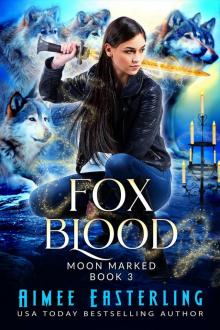 Fox Blood
Fox Blood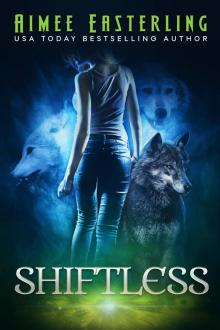 Shiftless: A Fantastical Werewolf Adventure
Shiftless: A Fantastical Werewolf Adventure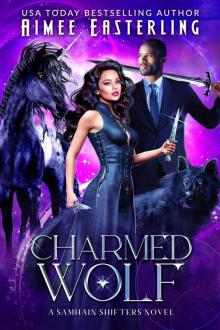 Charmed Wolf
Charmed Wolf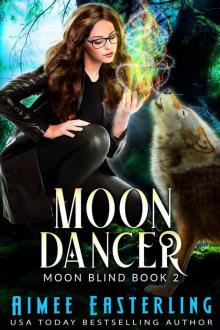 Moon Dancer
Moon Dancer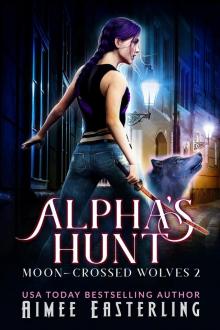 Alpha's Hunt
Alpha's Hunt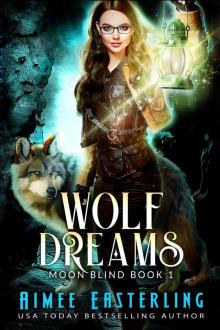 Wolf Dreams
Wolf Dreams Alpha Underground Trilogy
Alpha Underground Trilogy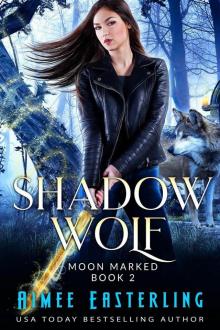 Shadow Wolf
Shadow Wolf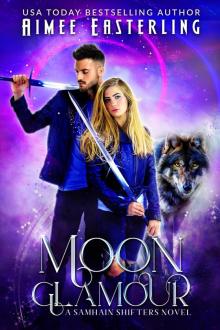 Moon Glamour
Moon Glamour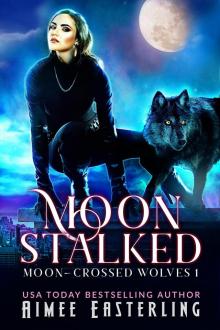 Moon Stalked
Moon Stalked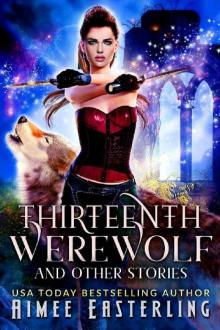 Thirteenth Werewolf and Other Stories
Thirteenth Werewolf and Other Stories Huntress Bound
Huntress Bound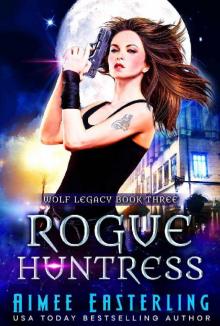 Rogue Huntress
Rogue Huntress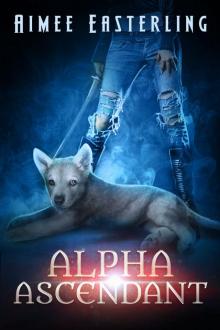 Alpha Ascendant: A Fantastical Werewolf Adventure (Wolf Rampant Book 3)
Alpha Ascendant: A Fantastical Werewolf Adventure (Wolf Rampant Book 3) Beyond Secret Worlds: Ten Stories of Paranormal Fantasy and Romance
Beyond Secret Worlds: Ten Stories of Paranormal Fantasy and Romance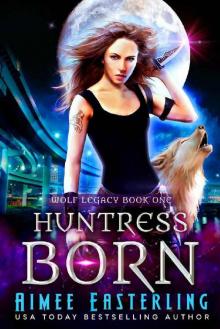 Huntress Born (Wolf Legacy Book 1)
Huntress Born (Wolf Legacy Book 1)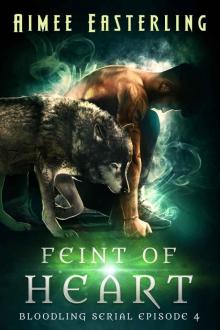 Feint of Heart
Feint of Heart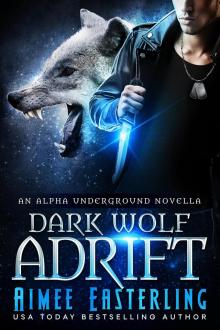 Dark Wolf Adrift
Dark Wolf Adrift Wolf Landing (Alpha Underground Book 3)
Wolf Landing (Alpha Underground Book 3)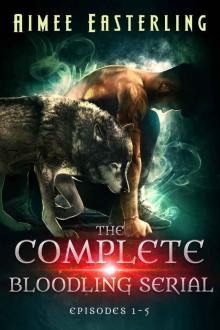 The Complete Bloodling Serial: Episodes 1-5
The Complete Bloodling Serial: Episodes 1-5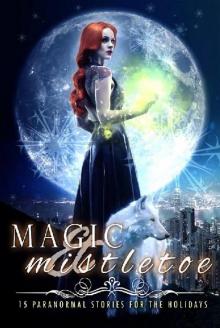 Magic & Mistletoe: 15 Paranormal Stories for the Holidays
Magic & Mistletoe: 15 Paranormal Stories for the Holidays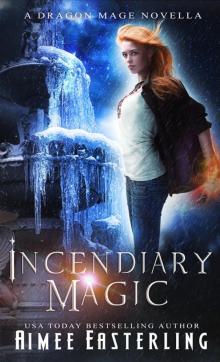 Incendiary Magic
Incendiary Magic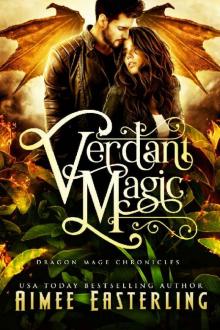 Verdant Magic: A Standalone Dragon Shifter Adventure (Dragon Mage Chronicles Book 1)
Verdant Magic: A Standalone Dragon Shifter Adventure (Dragon Mage Chronicles Book 1)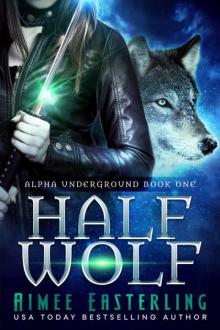 Half Wolf (Alpha Underground Book 1)
Half Wolf (Alpha Underground Book 1)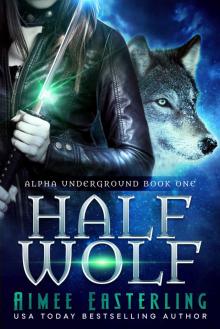 Half Wolf
Half Wolf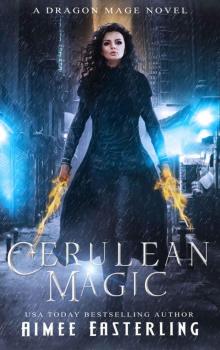 Cerulean Magic: A Dragon Mage Novel
Cerulean Magic: A Dragon Mage Novel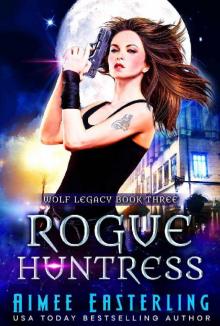 Rogue Huntress (Wolf Legacy Book 3)
Rogue Huntress (Wolf Legacy Book 3)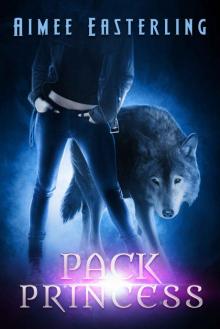 Pack Princess: A Fantastical Werewolf Adventure (Wolf Rampant Book 2)
Pack Princess: A Fantastical Werewolf Adventure (Wolf Rampant Book 2)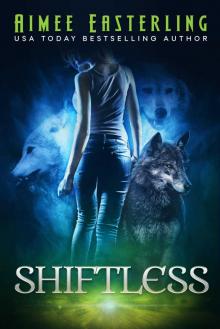 Shiftless
Shiftless Huntress Bound (Wolf Legacy Book 2)
Huntress Bound (Wolf Legacy Book 2) Street Spells: Seven Urban Fantasy Shorts
Street Spells: Seven Urban Fantasy Shorts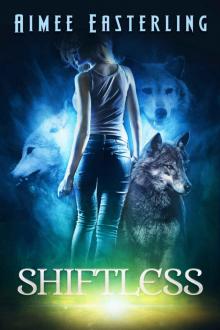 Shiftless: A Fantastical Werewolf Adventure (Wolf Rampant Book 1)
Shiftless: A Fantastical Werewolf Adventure (Wolf Rampant Book 1) Lone Wolf Dawn (Alpha Underground Book 2)
Lone Wolf Dawn (Alpha Underground Book 2) Jaguar at the Portal
Jaguar at the Portal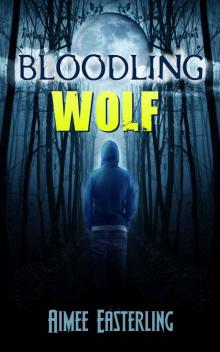 Bloodling Wolf
Bloodling Wolf